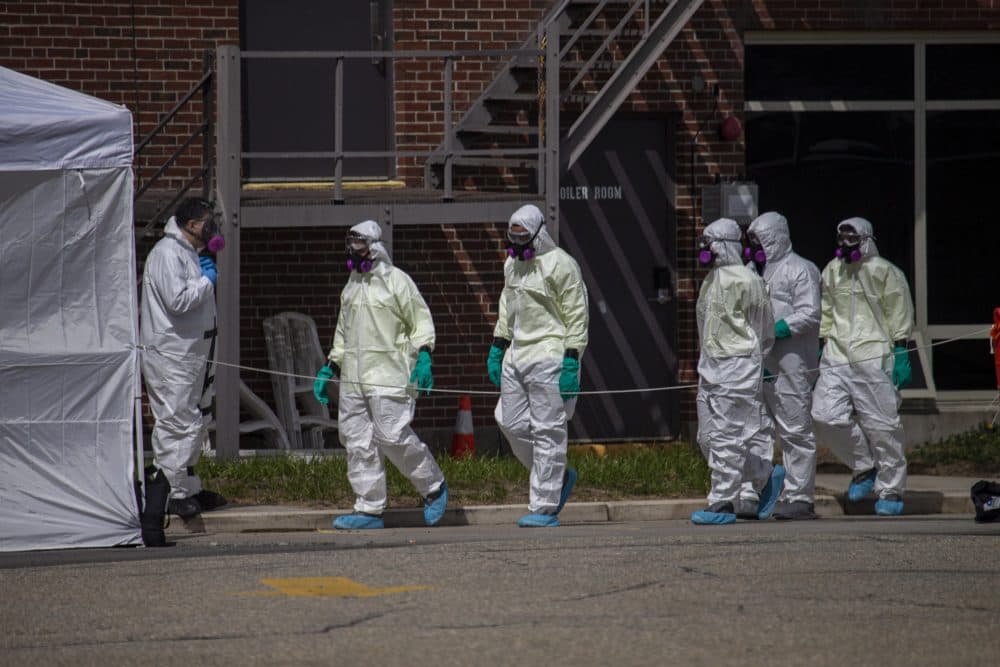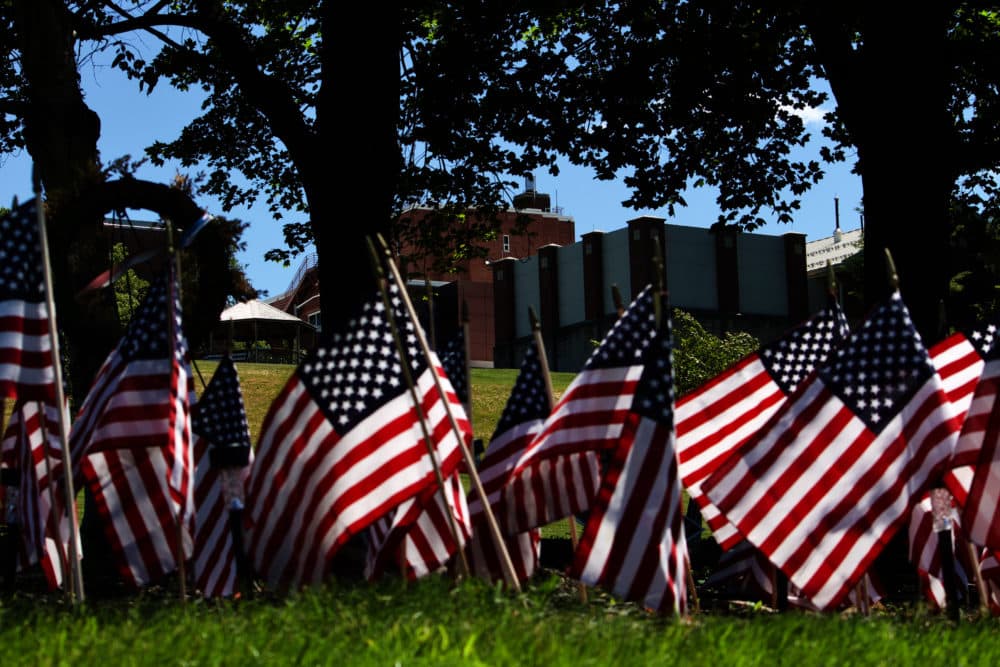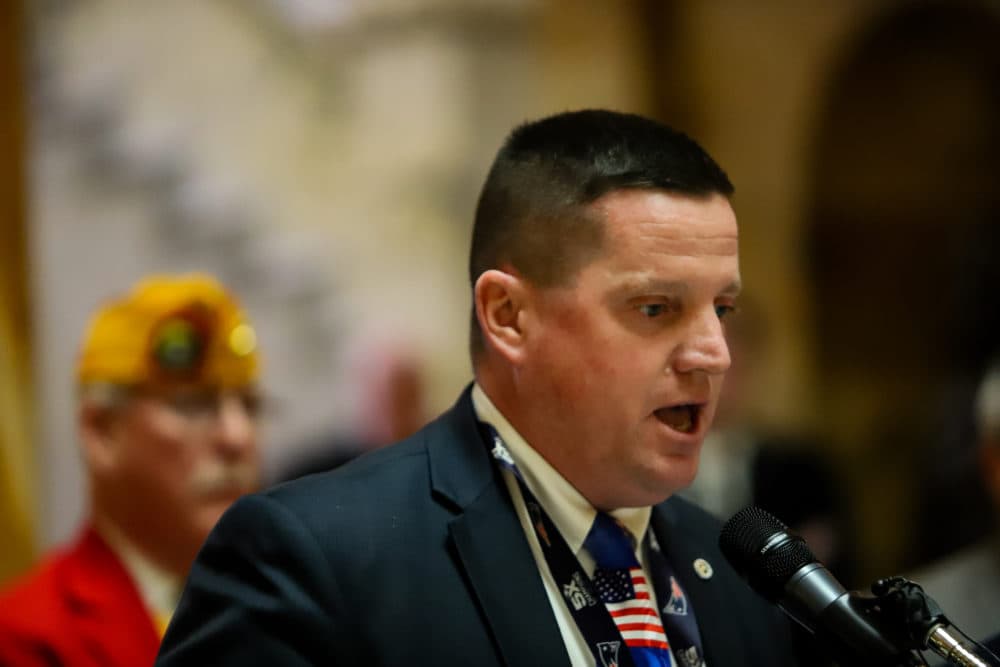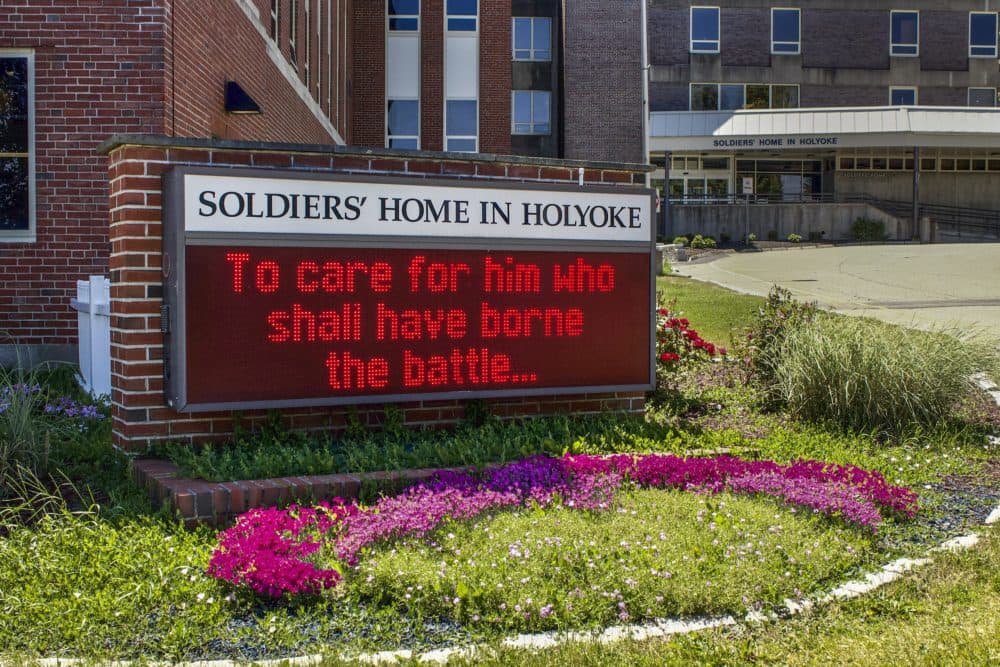Advertisement
State Report On Holyoke Soldiers' Home Finds 'Utterly Baffling' Management Missteps Exacerbated COVID Outbreak

The first government report about the deadly coronavirus outbreak at the Holyoke Soldiers' Home was released Wednesday morning.
The damning 174-page publication found no cover-up at the state-run veterans home, but concluded that the home's superintendent, Bennett Walsh, and his administrative team made "substantial errors" that "likely contributed to the death toll during the outbreak," and that Secretary of Veteran Affairs Francisco Urena "did not take sufficient action to address Mr. Walsh’s deficits."
During a press conference Wednesday, Gov. Charlie Baker said he planned to fire Walsh, who has been on paid administrative leave since March 30. He also said that Health and Human Services Secretary Marylou Sudders asked Urena to resign from his post Tuesday night ahead of the report's publication.
"Standing alone, neither the existence nor even the extensive scope of the COVID-19 outbreak at the Soldiers’ Home demonstrate that the Home’s leaders ... failed in their mission, or that the Commonwealth’s oversight of the Home was insufficient," the report stated.
However "some of the critical decisions made by Mr. Walsh and his leadership team during the final two weeks of March 2020 were utterly baffling from an infection-control perspective, and were inconsistent with the Home’s mission to treat its veterans with honor and dignity."
The most striking example cited by the report was the leadership team's decision to combine two floors of residents, a move that ended up mixing veterans who had the virus with those who did not. It still remains unclear who exactly made the call to do this because, as noted in the report, much of the leadership team declined to take responsibility for the decision.
"Rather than isolating those with the disease from those who were asymptomatic—a basic tenet of infection control—the consolidation of these two units resulted in more than 40 veterans crowded into a space designed to hold 25," the report stated. "This overcrowding was the opposite of infection control."
In addition to combining floors, the report cited six other substantial failures by the leadership team:
- Not isolating patients suspected of having the virus
- Not immediately testing veterans who showed COVID-19 symptoms
- Waiting too long to close common spaces in the home
- Rotating staff among units
- Not having consistent policies for personal protective equipment
- Failing to properly document the problem and keep records
Advertisement
Regarding documentation, the report notes that state rules contributed to the home's under-reporting COVID deaths in March. Because the home was awaiting coronavirus test results for some of the deceased, those COVID deaths were not reported, which was permissible under state rules at the time.

“Evidence contained in this report makes clear that there was an abject failure of leadership at the Holyoke Soldiers' Home by the superintendent and other members of his team," Gov. Baker said at a press conference Wednesday. “Veterans who deserve the best from state government got exactly the opposite and there's no excuse or plausible explanation for that."
At multiple points during the press conference, Baker noted that Superintendent Walsh was unqualified for his job, and that the Department of Veteran affairs "did not do the job we should have done in overseeing Bennett Walsh and the Soldiers' Home."
Walsh told the State House News Service that the report "contains many baseless accusations that are immaterial to the issues under consideration." Walsh's lawyer said Wednesday night that his client is "reviewing legal options."
While the report does say that some of the blame for the outbreak rests with other members of the leadership team and long-standing problems at the home, investigators determined that Walsh and Urena are the two most responsible for the crisis.
Walsh, a retired marine who served in Afghanistan, Iraq and Somalia, had no medical background and no experience leading an organization like the Soldiers' Home. But after applying for the job and gaining the Board of Trustees' approval, the Baker administration appointed him superintendent in May 2016.
"Mr. Walsh is a polarizing figure," the report states. While he cared deeply about the veterans in the home, his management style, as one employee put it, was characterized by "retaliation, bullying, unnecessary commentary, and not enough training." He was also said to have anger issues and poor communication skills.
"John Crotty, who served as Deputy Superintendent under Mr. Walsh from January 2017 until June 2019, also offered blunt observations about Mr. Walsh’s leadership style," the report states. Crotty says he was initially 'close' with Mr. Walsh and consulted on major decisions — but after he disagreed with Mr. Walsh in front of other staff, he was isolated and shut out from consultation on important matters. As Mr. Crotty put it, 'don’t disagree with him with others present, or you will pay a dear price.'"
Secretary Urena was apparently aware of these leadership deficiencies, and along with HHS Secretary Sudders, had concerns about Walsh's capabilities. But according to the report, Urena did nothing to remedy the problem except require Walsh to work with an "executive coach to address anger management issues."
"Secretary Urena has been a spectacular ambassador and supporter of veterans here in the Commonwealth," Baker said Wednesday. "But as the report makes clear, the Department of Veteran Affairs failed to properly oversee the home."
Baker said Urena graciously stepped down from the post.
Beyond Walsh and Urena, the report also highlighted the state's failure to fill two positions — a deputy superintendent to report to Walsh, and an executive director of veteran's homes at the Department of Veteran Affairs to oversee the Holyoke home and its sister facility in Chelsea. As WBUR previously reported, the state Legislature created the executive director position to ensure there was someone with "healthcare oversight experience" overseeing the homes. That position was never filled for budgetary reasons, according to the report.

In previous interviews, employees of the Soldiers’ Home described Walsh and his leadership team as vindictive and insular. Though not stated in the report, WBUR has confirmed that at least four of the nine people working closely with Walsh — Vanessa Lauziere, chief nursing officer; Celeste Surreira, assistant director of nursing; Vanessa Gosselin, infection control nurse; and Dr. David Clinton, medical director — have either resigned or been demoted.
Several staff interviewed by investigators raised flags about Clinton, the part-time medical director. One nurse said she "was not really impressed with Dr. Clinton’s practice—or lack of it—as a Medical Director," while Val Liptak, who took over as acting Superintendent on March 30 said Clinton was “not a strong physician to lead the organization."
Clinton, according to the report, made $116,000 annually for working 20 hours per week. He resigned in mid-May.
"[COVID] is an enormously challenging issue for anybody in long-term care," Gov. Baker said Wednesday. "But in this particular case there were some really significant errors in judgment that I think Mark [Pearlstein] referred to as 'utterly baffling,' and we would agree."
Baker called the report "nothing short of gut-wrenching," adding that, "in fact, this report is hard to read." He said his administration will address "immediate clinical deficiencies," and would release more details about their plans tomorrow.
Some of the most disturbing parts of the report come from interviews with staff who were ordered to move patients into the consolidated dementia units, despite knowing it was a bad — and dangerous — move.
"A recreational therapist who was instructed to help with the move said that she felt like she was ‘walking [the veterans] to their death’ and that the veterans were 'terrified,'" the report says. "A social worker 'felt it was like moving the concentration camp—we [were] moving these unknowing veterans off to die.'"
"One staff member stated that she 'will never get those images out of my mind—what we did, what was done to those veterans,' and 'thought my god, where is the respect and dignity for these men?'"

Baker acknowledged Soldiers' Home staff had been "permanently traumatized" by the events there, and said that his administration would be "outlining several measures to address the trauma the staff have experienced in their working conditions."
Joe Ramirez, a certified nursing assistant at the home, said he was glad to hear Baker acknowledge the toll these last few months have taken on staff and he hopes the governor makes good on his promise.
"We're still struggling. They say there's stages of grief that you go through, and I think people are still on different levels of that," Ramirez said. "Some are still angry, some are still sad or somewhat depressed. Some don't know what to do. A lot of people want to quit or retire early."
Ramirez said the report was the talk of the Soldiers’ Home on Wednesday, and that he and other employees were relieved to see that investigators went into great detail about problems at the home.
"I felt there was something lifted off my shoulders. Everything we did and went through did not get lost, did not fall on deaf ears," he said. "And finally, the public, the families and everybody that doesn't know about the home will finally know what an amazing group of staff we have that truly, truly are there for the veterans."
Ramirez also said he supports Urena’s resignation and the imminent firing of Walsh. "I think it is long overdue," he said. "We have been fighting for the last two years with Mr. Walsh and his administration [over] staffing issues, retaliation, bullying … Yet, nothing was ever done. So I think it is about time that they clean house, so to speak."
Families who lost loved ones to COVID-19 in the home echoed much of the same sentiment. They were glad to see the investigators delve deep into the crisis and bluntly lay out a variety of leadership failures.
"That made me feel good knowing that this wasn't all getting swept under the rug," said Laurie Beaudette. Her father, James Mandeville, died from COVID-19 in April after living in the Soldiers’ Home for 16 years.
"But then there's this other part of me that's really angry," she added. "These people are resigning and everything, but we still want justice. And justice for us right now is to make sure that this never happens again to any other veteran."
Beaudette and other families are demanding the state to give the Holyoke Soldiers’ Home more funding and construct a new building for the veterans who live there.
“Honestly, it's my dad that's giving me the strength right now. I've literally taken my grief and just compartmentalized it,” she said. “Right now, this is the most important thing.”
Investigators conducted 111 interviews with 100 witnesses and reviewed more than 17,000 documents, the report noted. Baker hired a former federal prosecutor, Mark Pearlstein, to oversee the investigation on April 1 after news broke that at least 11 veterans had died from COVID-19.
To date, 76 veterans at the Soldiers' Home have died from the virus. All other residents and most staff who tested positive have recovered.
Massachusetts Attorney General Maura Healey, the U.S. Justice Department and the state inspector general all have pending investigations into the home as well.
“The report reveals that serious failures by leadership at the home contributed to the tragic loss of life there," Healey said in a statement Wednesday. "It also lays bare systemic failures of oversight by the Baker Administration in adequately preparing, staffing, and responding to this crisis to protect our veterans. These veterans served our country and risked their lives to protect us, and our state wholly failed to protect them."
Healey added that her investigation "will determine whether these missteps and errors warrant legal action."
WBUR's Lisa Creamer and Barbara Moran contributed to this report.
Correction: An earlier version of this post, misstated the number of pages in the report. The story has been updated. We regret the error.
This article was originally published on June 24, 2020.
This segment aired on June 25, 2020.
